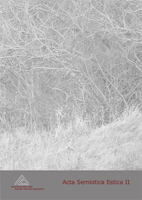Luule kui sõjakunst
Poetry as Art of War
Author(s): Mihhail LotmanSubject(s): Semiotics / Semiology
Published by: Eesti Semiootika Selts
Keywords: semiotics of poetry; Russian poetry; metaphor; ottava rima; avant-garde; luulesemiootika; metafoor; vene luule; ottava rima; avangard
Summary/Abstract: The article has a twofold aim: on the one hand, it is an analysis of verse structure with semiotic methods; on the other hand, it describes an archetype of poetic language that so far has not received much attention. Semiotically, poetic language is a multifaceted heterogeneous structure; it is a system that in fact consists of several corresponding languages. These languages have their own semantic peculiarities: thus, meter and rhythm emphasize the temporal dimension, while rhetorical structure is connected foremost with spatiality and visuality. There is a certain motif that runs through the history of different poetic cultures: the connectedness of the art of verse with the military. This connection is observable also in the modern era, and it is noteworthy that each cultural epoch creates its own models that are realized both in the military as well as in verse composition. During classicism when troops were lined up in columns, the most important genre in Russian poetry was the ode with its form of numbered identical stanzas, associating with parading troops. In the romantic era when Napoleon broke off the traditions of building up the troops, elegies written in heterometrical iambi and poems written in free rhyme became the dominant poetic pattern in Russian poetry. The avant-garde destroyed the integrity of a verse line. Analogous processes can also be observed in the military: the term 'dispersed chain' was used both as a poetic and as a military term. How this motif is realised in a text is exemplified by two poems written in different epochs: Pushkin's A Small House in Kolomna (1830) and Mayakovski's 150,000,000 (1918).
Journal: Acta Semiotica Estica
- Issue Year: 2005
- Issue No: 2
- Page Range: 021-042
- Page Count: 22
- Language: Estonian

